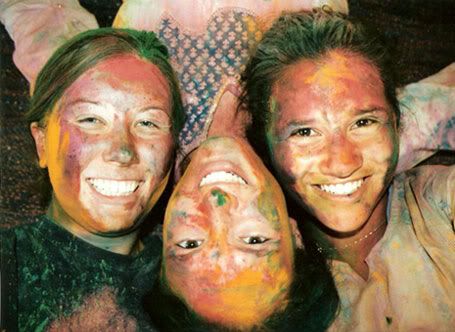This op-ed piece appeared in today's New York Times:
The Flags of Our Sons
By BILLY SHORE
Published: August 4, 2006
Washington
WHEN you fly as often as I do you learn to mind your own business as soon as you take your seat. But that wasn’t possible once I saw the military honor guard boarding US Airways’ 1:45 p.m. flight from Boston to Washington earlier this week.
I was heading through the gate when I first noticed Senator Ted Kennedy, walking down the concourse and arriving fashionably late, not an uncommon sight on this route. I stepped aside and followed him down the ramp.
As we got to the arched entrance of the plane, the members of a Marine honor guard in their dress blues were coming up that outside staircase usually used for stowing strollers and allowing mechanics on board. The marine in charge held in both hands a flag that had been folded into a triangle as if it had been previously draping a coffin, which it had.
Senator Kennedy extended his hand to the marine and said, “Thank you for your service.”
“Thank you, sir,” replied the marine.
“Are you escorting remains?” asked Senator Kennedy.
“Yes, sir, a marine.”
“And the funeral is at Arlington Cemetery?”
“Yes, sir, on Wednesday.”
“Thank you, I’ll try to get out there.”
The marine went back to sit in coach, but a man in the last row of the first-class cabin went over to him, shook hands and offered his seat. The marine reluctantly accepted. Half the passengers broke into applause.
The rest of the flight was uneventful, though quieter than usual. When we landed, the marine took his white gloves from where he’d stowed them inside his hat, put them on, and again gripped with both hands the precious cargo of the folded flag.
Then he went over to two people quietly sitting in first class — the parents of the fallen marine. None of us had known they were there.
He escorted them off the plane and into the terminal. Because of the afternoon’s oppressive heat and humidity, he had persuaded them to wait inside instead of on the tarmac.
The father looked as if he might have once been a marine himself, a handsome man of perfect posture, with bristly silver hair, dressed smartly in a blue blazer and gray slacks. The mother, blond, wore light-colored pants and an orange jacket. Her glasses made her eyes seem bigger than they were. They both looked calm, if a little lost, and gave off an aura of deep quiet. As she walked by me she noticed that a tie had fallen as I was removing something from my carry-on bag and she stopped and pointed. “I think you dropped something,” she said softly.
They stood at the window between Gates 43 and 45 and watched as a full Marine honor guard marched up the tarmac, coming to attention between the plane and a silver military hearse. The unloading of their son’s coffin from the cargo hold was very slow, and every time someone inside the terminal noticed and stopped to stare, someone else noticed and did the same, and this kept happening until about 20 people stood in silence watching out the window.
The mom leaned her elbows on the window ledge, supporting her chin and cheeks with both hands. She remained perfectly still. She stared for 10 or 15 long minutes and never moved. The father stood nearby, rocking from foot to foot and pacing a bit. They did not touch; they did not say a word to each other. Neither wore a wedding band. Perhaps they were divorced, or simply isolated in their pain.
Standing nearby was a man wearing the T-shirt of a suburban fire and rescue department that he may have earned 20 years and 35 pounds ago. He went over to the parents to chat, not knowing who they were, just one curious spectator to another.
But whatever he said to the mother caused her to turn and look at him in disbelief. Her lips didn’t move, which only encouraged him to repeat it. Her eyes widened and her chin tilted upward like a boxer who had taken a blow. She stared at him and then looked back outside toward her son. Down on the tarmac the white gloves of eight marines snapped their final salute as the doors of the hearse closed.
The P.A. system announced flights for Atlanta and Chicago. Travelers rushed to business meetings or summer vacations. The line for Auntie Anne’s pretzels was as long as ever.
Except for a handful of us standing frozen at a respectful distance from the window, the war and its carnage might as well have been on another planet. The disconnect between those who serve and those of us who are beneficiaries of their service has always felt great to me, but never greater than at that moment.
The mom and dad stepped away from the man in the T-shirt and to another window, still not touching, their movement synchronized by grief. They waited until the marine in charge came back up from the runway to escort them to a government vehicle. I went to my car and drove to work with no ambition for the day other than to be worthy.
Subscribe to:
Post Comments (Atom)

1 comment:
what a great article! i wanna know what the man in the t-shirt said.
Post a Comment